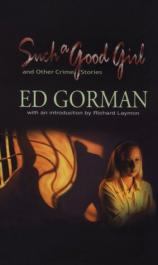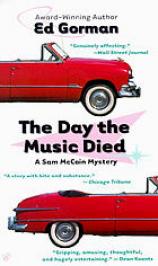Such a Good Girl and Other Crime Stories
Review
Such a Good Girl and Other Crime Stories
The outlets for short fiction in the crime genre are kind of a mixed bag, as far as the distribution power is concerned. There are of course the Ellery Queen and Alfred Hitchcock magazines, which are available at most full service newsstands. Other than that it's mostly really small presses, irregularly published and infrequently found, but fighting the good fight nonetheless. The smaller guys are helped along by big name writers who throw a quality story or three their way once in a while, for much less than they could ask for and get, just to keep things alive. Then there are the original anthologies, which more and more are providing an outlet for authors and a source for readers.
SUCH A GOOD GIRL is an interesting mix of original anthology and reprinted short fiction by Ed Gorman, whose annual output would be considered indefatigable if it were limited to his novels and his editorial work. His short fiction in the mystery and suspense genre is...well, it's quite a bit darker and edgier than his more recent novels, and interestingly enough, demonstrates new and unplumbed territories of his talent. There are eleven stories here, four of which, at least to my knowledge, see publication here for the first time. Except for "Angie" (from 1999) the other seven are drawn from anthologies and limited circulation periodicals published between 1996 and the present. Of these, it's doubtful that anyone but the most hard-core Gorman fan would have read all of them, and it's quite possible never to have bumped into any of them. As a result, SUCH A GOOD GIRL is a treasure trove of new Gorman.
Things start off just a bit slowly with "All These Condemned," a story of two brothers, one an underachiever, one an overachiever. They share a secret --- their respective motives are not entirely pure, though Gorman by the end manages to both shade their respective roles and save the story. Following is "A Girl Like You," a fairly simple tale, and maybe the odd man out in this collection. It is not, strictly speaking, a crime story, and not so much a mystery as a fantasy; yet in many ways this story about a young man's first love affair with a mysterious, heartbreaking woman, is the best story of the collection. I cannot imagine any man reading this story and not being reminded of someone in his past.
"The Way It Used To Be" saves its punch for the ending. A disturbed young man is determined to protect his younger sister from an interracial relationship, and the reader senses from almost the first sentence of this story that things will not end well. The reader, alas, is right. "A New Man," perhaps the lightest story in the volume, still packs a punch. The premise of the story --- that John Dillinger walked away from an FBI ambush and assumed a new identity, is interesting as whimsy, and the tit-for-tat denouement is more consistent with Gorman's lighter work.
Things turn a bit darker with "Judgement." This story concerning the administration of rough justice from a surprising source, is as interesting a story as you may read all year. It is, however, not for the squeamish. "Ghosts," a story of a holdup gone bad and its consequences, is perhaps the weakest story in the book --- but only because the company it keeps is so strong. And while "That Day at Eagle's Point" is, again, not strictly a crime or mystery story, it is a fine character study that slices in and out of life and actions and the different consequences those actions can take. Along somewhat similar lines is "Such a Good Girl," the title story and a disturbing tale of addiction and its consequences. Those who consider substance abuse and addiction to be victimless crimes would be well advised to read this story, which is less a tale of fiction than of documentary.
"Aftermath," on the other hand, utilizes the current trend in reality television to bring a rapist to justice. "Eye of the Beholder" is an account of the consequences of beauty and, interestingly enough, is faintly reminiscent of the best of Ross MacDonald's shorter fiction. The volume closes with "Angie," which along with "Such a Good Girl," is the most disturbing story in the book. This tale of a child caught in inconvenient circumstances could well be allegorical for our times. This is a story that, dark as it is, bears reading and rereading.
Gorman is one of our major talents who deserves wider respect and recognition among the reading populace than he has received to date. Hopefully volumes such as SUCH A GOOD GIRL will provide him with that in the future.
Reviewed by Joe Hartlaub on January 1, 2001




